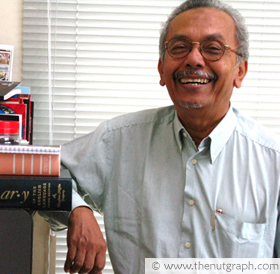
AWARD-winning journalist Zainon Ahmad is a story-teller. He has many stories because he has been reporting from the frontlines for more than 30 years. He joined the New Straits Times in 1978 and rose through the ranks to become the paper’s assistant group editor in 1997.
From the mid- to late 1980s, he was made the paper’s editor-at-large and travelled and covered assignments in southern Thailand, Cambodia, the Philippines, India, Afghanistan and Latin America. “I was really happy! They thought it was a punishment but I thought it was a reward,” Zainon remembers of the political manoeuvrings within the company. Eventually, it was the politics within the newsroom of the Umno-owned paper that led to his being sacked as editorial consultant in 2001.
In the following year, he was recruited by theSun to be its editor-in-chief and in 2008, he was made consultant and political editor, positions he holds up till today.
Zainon, 70, grew up with Tamils in an estate in Kedah and attended a mission school where he read the bible for a paper on religious knowledge.
“If…suddenly, all the Indians or the Chinese decide to leave Malaysia, I think it won’t be Malaysia,” he says in an 8 Feb 2012 interview at his office in Petaling Jaya. Zainon’s fortnightly column in theSun titled What They Say features a Mohan, Azman, Zain and Chong, usually in a teh tarik place discussing a current issue. These are often real conversations he overhears, he says.
Zainon has an MA in history from Universiti Malaya. When the personalities in his column tell their own stories about Malaysia, what the veteran journalist is doing is ensuring that Malaysia’s history, for better or for worse, continues to be recorded.
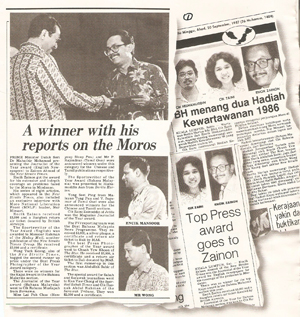
TNG: When and where were you born?
Zainon Ahmad: I was born in 1942 in Semeling, a small village near Bidong, on the way to Lembah Bujang [in Kedah].
And did you grow up in Semeling?
My early childhood was in Semeling until after the Japanese occupation in 1945/1946 when my father moved to the Patani Para estate, about 12 miles from Semeling.
He was a mechanic at the then Penang Harbour Board. And he spoke English, Hokkien and Tamil. At the estate, his job was to bring Malays from the villages to work as labourers because the estate workers were predominantly Tamil.
When the British left before the war, they just blew up all the factories [so the Japanese could not use them]. So, one of my father’s jobs, as the [foreperson] and mechanic, was to restore some of these machines temporarily so that they could process the latex into rubber sheets.
Before we moved to the estate, he used to cycle 24 miles every day to go to the estate and back. Those days, we thought nothing of it lah.
I lived in the estate for much of my life until I was in Form 3. My grandmother used to send me to a Malay kindergarten in Semeling when I was about three or four years old. Those days we wrote on slates — a piece of soft stone with a wooden border. We wrote using a stick of this stone. And then you could wash it off with water.
I disliked school. So, whenever I lost my temper, I used to throw the slate on the road and it would break [laughs]. My father said, “Enough is enough”, and he took me to the estate and sent me to a nearby Malay school. For a while before going to the Malay school, I was also going to the Tamil school which was attached to a Tamil Hindu temple. I managed to learn the Tamil alphabet.
And then after the Malay school, I was sent to St Theresa School in Sungai Petani. In the estate, there were Chinese, mostly carpenters. Their children would go to the Chinese school in nearby Sungai Lallang. We were all friends. I actually had a very happy childhood.
And it was very mixed, wasn’t it?
Yes. My mother, whenever there was a Hindu wedding, she would be there making kuih and doing the décor and all that. I loved those days, you know. And there was this Chinese shopkeeper who had two beautiful daughters [laughs]. It was a great past time for the estate boys to flirt with them.
So all this was happening in Patani Para estate?
Yes, it was a big estate, and where I grew up for the most part. But my grandfather, my mother’s father, came from Kerala. Married a local woman in a fishing village we used to call Kuala, not far from Kota Kuala Muda town.
So, that was the village my grandmother was from. My grandfather, the mamak, worked those tongkang. There were a lot of tongkang in Penang which were all under the mamak bosses. So when my grandfather married my grandmother, he bought his own tongkang which he used to take Kuala villagers for deep-sea fishing.
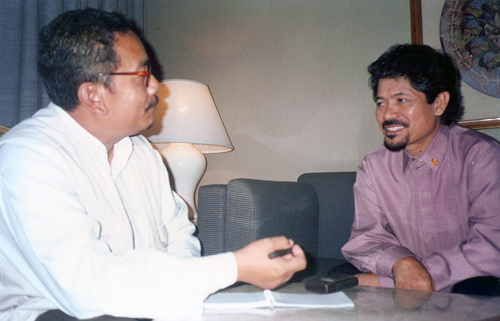
And what about your dad’s side?
His grandfather used to own a vast tract of land in Kampung Bukit Kecil. This is also not far from Kota Kuala Muda. I suppose that’s how my father met my mother. I think, I don’t know for sure, that the land was sold off. And when my father was born, there were just some orchards and padi fields. So, when I was a child, we used to go there during the fruit and harvesting seasons. It was quite exciting those days because there was no other entertainment [chuckles]. Running around in an empty padi field was the best.
I remember when news came that the Japanese had surrendered. I remember my father and his friends rode their bicycles in Semeling. Oh, hands-free and making all kinds of noises. I don’t know what word they used for “freedom” because we hadn’t yet heard of the word “merdeka”.
So, it sounds like you had a childhood that was culturally mixed and that really drew from the outdoors.
And it influenced my life. For instance, it doesn’t make me hesitate [around other cultures]. Because of so much indoctrination on radio and television, [some Muslims] are scared to go near a temple, much less to go near an idol.
But in those days at 9am and 7pm, the estate temple priest or poosari would do the pooja in praise of the deities when he sang and recited words in Sanskrit. So somebody had to ring the bell outside. And if the priest looked around and there was no Hindu around, anybody that passed by would be it. And I always made sure I was there!
You know why? I would ring the bell that was hanging from the roof until the priest finished his pooja. And the reward was that I would get half a coconut, boiled chickpeas, one or two vadai, and one or two pisang emas. I would take the food, give some to my friends and give the half coconut to my mother. The priest would take home the sireh leaves and some of the food offered to the deities.
And then I went to St Theresa School next to a Catholic church.
You mentioned once to me that it was in St Theresa School that you did bible studies, and you can recite quotes from the bible.
Ya, I did religious knowledge. For the LCE (Lower Certificate of Examination), I can’t remember if it was an A or a B I got for the paper [chuckles]. Until today, I can still recite the part about “thy prayer has been heard and thy wife Elizabeth shall bear thee a child whom thou shall call John”.
In 1953, we celebrated [Queen Elizabeth II’s] coronation. We sang “God save the Queen” in school and in the town padang [laughs] where we listened to the speech by the High Commissioner, of course read by the DO (district officer). We were each given a 50 sen note – it wasn’t a coin, it was a note – one raisin bun, plus a bottle of Green Spot orange [laughs]. And one cinema ticket. There were two cinemas in Sungai Petani at that time. One was Queen’s. The other was Empire [chuckles].
[…]
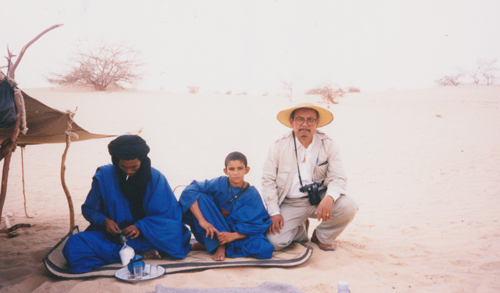
So, what generation Malaysian are you? On your mum’s side, you would be second generation?
Ya.
And what was the ancestry like on dad’s side?
I suppose it was the same like my mother.
And he was local?
Yes, he was a local Malay.
Not from southern Thailand?
Ah, that one we don’t know. Mostly the Malays from Kedah had all sorts of influence. Either from Thailand or from Penang. If Penang, means mamak lah. Or could be Arab. In the jargon of those days you are either DKK (darah keturunan Keling) or DKA (darah keturunan Arab).
What kind of stories from your family do you hold onto and that you would pass on or have passed on to your children?
I used to tell my children about myself. After my father and mother divorced, my mum, my five siblings and I continued to live in the estate until I was in Form 2 when my mother decided to go off to her kampung in Kuala. She said, “If you follow me, you can’t go to school. I can’t afford it.”
I had an Indian classmate and his father, an estate conductor, said, “Why don’t you come and stay with us?” There was a storeroom for the rubber scraps attached to his house and I stayed in that room. In that room, they had their Hindu altar. For a few nights, it was quite terrifying [laughs]. There was this deity, Durga, I think. In the dim light of the coconut oil lamp I could see it carried a pedang and a bloody head. I can still see it today. So, for a while, I couldn’t sleep. After a while, it was fine. So, I’m actually quite used to these images.
I stayed there till Form 5. I was separated from my mother and siblings. But I visited them whenever I could.
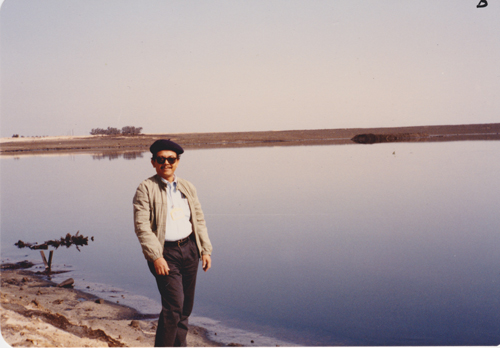
Staying with an Indian family was challenging because there were many Malay villages nearby. And the villagers said, “Why are you staying there?” And then some relative passed word around that, “This Indian man was going to go back to India, and Zainon will be taken with them.” I was sort of ostracised by some in my own community. I told myself, “I want to study.”
In St Theresa School, I did quite well in LCE and because only ten passed the exam, we were transferred to Ibrahim Secondary School. I continued to work in the estate but despite this I did quite well in my School Certificate of Examination. I got first grade and was praised at the school assembly.
All the teachers knew of my situation. So just before the first term ended a few of them came to me, “Eh, Zainon, can you pay your exam fees?” At that time, exam fees were RM60 or RM65. So, I said, “Yes, can.” Because during the first term school holiday, I had a contract to put fertiliser in one small estate.
And there was a teacher, Mrs Nair, who helped me a lot. Any opportunity to make money like when the science lab assistant was absent during weekend classes, “Zainon, you work for 50 sen an hour.” Sometimes, I was quite happy also because convent school girls would come to do their practical there, so I would be in my best of dress [chuckles].
So when the money came, I went to pay my fees. And Mrs Nair called me. “Zainon, all the teachers agreed that you use this money that you have to buy some new clothes for yourself. We have already paid your fees.”
What experience makes you feel most Malaysian?
First of all, I believe in Malaysia. I believe in multi-racial Malaysia and I think that there is a place for everybody here. If, for instance, all the Indians or the Chinese suddenly decide to leave Malaysia, I think it won’t be Malaysia.
I think the fact that we are all living together here [means] we could have more understanding. I see no reason why we can’t feel free to visit and eat in a non-Muslim’s home. I think it’s the way Islam is taught in this country.
Did you feel, for example, when you were studying the bible in school and when you were sleeping in this room that had Hindu deities, that your faith was in some way challenged? It didn’t stop you from continuing to be a Muslim, right?
I went to the mosque every Friday. I fasted. The Indian family had a kitchen that was attached to the house that had a different door which was always padlocked. I was given the key so that when I woke up before dawn, I could cook for my sahur. They helped me. They understood that I am a Muslim.
I took my grandchildren to Batu Caves last year for Thaipusam. I showed them the people carrying the kavadi, the food and the crush of the people. They enjoyed it! They want to go again next year [chuckles].
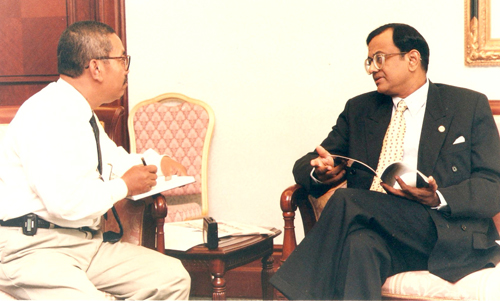
Do you struggle with any aspects of your identity as a Malaysian?
I’m still bothered when they say “bangsa” for the racial boxes we have to fill in. Why use “bangsa”? I thought “bangsa” refers to Malaysian. Even on TV, when they announce “bangsa India”, which are they referring to? Indian nationals? Or Indian Malaysians?
These kinds of things should be dealt with. The point is that nobody is honest enough to come forward especially with the likes of Perkasa around. And [I don’t think] (Prime Minister Datuk Seri) Najib (Razak) feels strong enough to handle this whole thing about race, identity and privilege.
That’s why whenever I write my column on race, I never say it’s a “right”. It’s a “privilege”. The non-Malays have privileges. The Malays, too, have privileges. They are not rights. If you want to say “Malay rights”, then the Indians, too have rights.
Most of my columns are about race relations….I also wrote about fatwas. I think there are too many fatwas. You know, these fatwa councils, they are not legislative bodies. And you can’t say the fatwas don’t affect non-Muslims because some do. Just think of the problems caused by a husband who converts to Islam.
All the Middle Eastern countries, there’s no problem. It is here. They say Muslims here need to be protected. How many NGOs have come up to protect Muslims?
Do the Muslims need further protection when the state is already protecting them?
Many Muslims disagree with what is happening but they won’t speak up. I’m speaking up a bit. Because I feel that even some of these lectures on TV don’t propagate the Islam that the Prophet used to teach. You know, calling non-Muslims “kafir”. I think they shouldn’t use the word at all. “Kafir” is very derogatory. But they are using it liberally in their lectures.
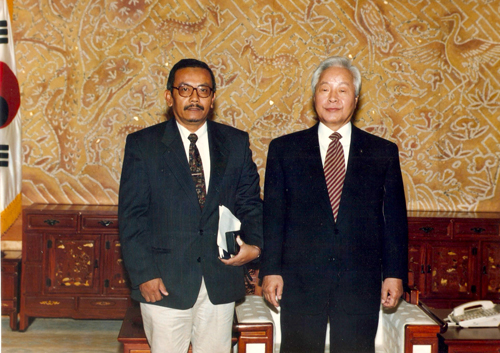
What kind of Malaysia would you like for yourself and future generations?
For me and my family, I want a Malaysia where everybody is safe. Where there is no suspicion of one another and there’s an ability to interact with each other without putting up walls.
You know, a while ago, my friend died. And my wife and I went to a church in Brickfields for his funeral service. My wife wears the tudung. We were standing outside with others while waiting for the service to be over. There were other people of other religions who didn’t want to go inside. But I told my wife, let’s go in to sit. So we sat in the pew. Hymns were being sung so I picked up the hymn book and flipped through the pages because the hymns were familiar from my school days [chuckles].
I held the book and sang along. And then one parishioner came and said, “Sir, you are a Muslim, I presume.” I said, “Yes, I am a Muslim. My wife is a Muslim.” “We are feeling very uncomfortable not because some Muslims might hammer you but because they might stone the church.” ![]()
 The book Found in Malaysia Volume 2, which was launched on Malaysia Day 2011, is now available in bookstores for RM50. It features previously unpublished interviews with Asha Gill, Lillian Too, Khairy Jamaluddin and Baru Bian. Volume 1 of Found in Malaysia, featuring 54 earlier interviews, is currently in its second print run and retailing at RM45
The book Found in Malaysia Volume 2, which was launched on Malaysia Day 2011, is now available in bookstores for RM50. It features previously unpublished interviews with Asha Gill, Lillian Too, Khairy Jamaluddin and Baru Bian. Volume 1 of Found in Malaysia, featuring 54 earlier interviews, is currently in its second print run and retailing at RM45


Haji Kler says
I really enjoyed this piece, thanks for sharing your story. I see Malaysia like you do and I am thankful that here in Sabah, I am confident the Church would not be stoned. And I am sad that in some parts of Malaysia it would happen. But I believe this indoctrination cannot last and things are changing for the positive and one day anyone from any race or religion will lead this country.
Adam says
Zainon Ahmad embodies all the qualities of who a true Malaysian should be. Although a decade younger than him, I have also experienced the common bond between all the races in the 50’s and 60’s. How I long to relive those good, old days. Now, I can only see such colour-blind inter-racial relationships in East Malaysia and that, too is becoming endangered. Sad, really.
Irene Chin says
This article makes my day. I have similar experiences growing up where my Muslim girl classmates would come to our house with the pigs running under the house. There was no mention of any infidels or any derogatory remarks. We were friends. During school recess, I used to go to my Muslim friend’s house, drink with them. In mission school, we assembled every morning and recited the Lord’s prayer. The Muslim students also participated. No one complained.
During the harvesting period, my mother’s Muslim friends helped us with harvesting. During low-tide, we slept at my mother’s Muslim friends’ house before fishing in the sea. During Hari Raya, the Kadazan people carried their back packs (sinaging) to go to their Muslim friends to get Raya goodies. Weddings and funerals were also attended by our Muslim friends in the church.
[In my opinion], the problem started during Mahathir’s rule. He spewed anti-non-Muslim [rhetoric] every time he opened his mouth. He destroyed all the good relationship among the people. It is sad that the seeds of hatred were started by Mahathir.
It will take Muslims [reversing this] ugly trend, if [we are] to have a harmonious Malaysia.
Lanson says
I feel so comfortable and close to my Malay brothers if only they can be so liberal and relaxed with the others of another race and religion. They are keeping their distance from the others as a result of constant indoctrination. I seriously hope that the government has the political will to stop those religious leaders, ulama and the likes of Perkasa, the Malay rights group, from issuing so many statements detrimental to the unity of all Malaysians.
jimmychan says
Being one of the baby boomers, I grew up in the kampong enjoying the same rapport with others experienced by you. All the missionary schools were run by Christian brothers and sisters. I do not recall any of the non- Christian students being influenced or converted to Christianity during that time or even after finishing Form Five. This issue on Kristianasisi is obviously a figment of someone’s imagination.
Maulana Wacko says
As a Malay Muslim, I am really ashamed of my own race whenever someone mentions about the Christian threat to Muslims in Malaysia. It does sound as if one can only find Muslims amongst Malay Malaysians, and no where else. Malays must grow up and not give any room for this bigotry.
Songhrek says
The life of a true-blue Malaysian. I hope that many more Malaysians with such growing up experiences write about it to counter the “tricks” being played upon the current generation.
Thank you, sir, for sharing.
Casper says
Yes Hj Kler, this touching narrative of Zainon Ahmad was worth the 10-15 minutes spent.
The fact that Zainon’s father spoke English, Tamil and Hokkien is testament of a more “colourful” Malaya, a different era now lost on us – pity (reminds me of my Std 3 Bahasa [teacher], Cikgu Baba, who could cuss with the best of ’em with his flawless Hokkien) – and I guess it was more norm than an exception for many residents of the Straits Settlement, [who were] engaged in commerce, to be conversant in more than one language, other than one’s mother tongue (just imagine the joy of being able to pick up [women] from a broader spectrum; spoilt for choice).
Zainon: on present day indoctrination – present (uptight) lot, especially the Umno set (and sinister cohorts), are more apt to make the headlines for the wrong reasons and contrast this prevailing atmosphere as Zainon recalls his spell as temple page (tasked with ringing the bell during prayers), “duty” performed before making classes at St.Theresa’s – had me thinking what an amazing time Zainon’s life [was] back then.
Many thanks Zainon for the narrative, while not forgetting JAS for its feature.
rajan says
AHHHHH!!! Memories, memories of the past!! How sweet the sound! Yes! I, too, lived that life which I miss so much.
Those were the days, my friend, those were the days! Till the mental cases came along! To spread fear and suspision! WTF! When can Malaysians live life like those days anymore! I miss those happy-go-lucky days!
Raja says
[…] kindly share more so that people like me [new generation] will learn the beauty of the life we should be living here.
OUR MALAYSIA!
There is no rights……
There is only privileges!!!!!!!!!!
Well said, sir. Well said!!!
Leaders …what have you done to this country?
Are you happy?
chong cheng hai says
Pak Non is a master story-teller all right. He is also a student of history and weaves captivating tales into his lessons. He is the embodiment of what a true Malaysian should be. I have been privileged to have worked with him and lucky to have heard many of his stories from his childhood in the estate in Sungai Petani and his encounters with all shades of Malayans and Malaysians. His column, What They Say, today is a fine example of his continuing efforts to ring the bell as it were to warn us of extremists in our midst.
Jacqueline Ann Surin says
Ya, I too, benefited from his stories while I was working in theSun newsroom. And I so enjoyed doing this interview with him. Such lovely, genuine stories of neighbourliness and community.
Pak Non, for me, encapsulates all that Malaysia is capable of and should be thankful for. We impoverish ourselves by believing that our racial diversity is a threat to the majority population of this nation.
Felyx Teoh says
Pak Non did not say [that] not far from there the Malays rear dogs. My Muslim friends say they can rear dogs for a certain purpose like guard dogs. [In] that area I went once the dogs followed the fishermen (riverine or open sea) out when they go to work.
catherine says
This man should be the PM of Malaysia! If only we had someone like him at the helm, Malaysia would be the loveliest place to live on earth. God bless him and may he spread his message of true brotherhood and 1Malaysia to everyone in the country.
Kong Kek Kuat says
@ chong cheng hai
And yet, the majority of Malays today would consider him as having strayed from the teachings of the Qur’an. Perhaps What They Say is not read by the majority of Malaysians who can hardly speak English?
Ann Teoh says
Thank you Pak Non for sharing your story. So heartwarming. Thank you Jacqueline for doing the interview.
Jarod says
I am touched to see such a story being shared. And I dream of seeing Malaysians willing to change and adopt such a mindset.
Just recently, I taught a group of young children English and suddenly, we were sharing about the pig. As I wrote it on the white board, the children went, “Eew, yuck.”
Since when have we taught our children to do such a thing? That even such a word is deemed “haram”?? Of course the food is not clean to some people. But it’s just a word. I do not know who to blame, but to feel sad that it has reached such a state…
Parents and my beloved countrymen and women, we have to do something about it.
Kamil says
I can relate to Zainon’s story as it is somewhat similar to the experiences of my late father and brothers, all from the same era. They all had non-Malay friends and were quite comfortable mixing with them. Our parents, devout Muslims, were quite liberal in outlook and I don’t ever remember any racist remarks from them. My elder brother married an Aussie and when she passed away, married a Chinese lady. My late wife is Punjabi converted to Islam, and my girlfriend now is Chinese. I have always told my friends that I am used to being in the minority because there were only a handful of Malay students in my form in both primary and secondary schools, so I had to learn to be friends with the Chinese and Indians! It was only when I started working that I found myself in a Malay-dominant environment.
I am sad with the current situation because when I go out, I see most students and even young adults mixing with their own ethnic group. This is not going to change until the political and socio-economic structure/policies change significantly!!
Nandkumar Nayar says
My sister sent me the link to this article. Upon reading the piece, it brought a big lump to my throat. The views of Mr. Zainon Ahmad are the so broad-minded and represent the best of Malaysia. I could “see” and “feel” the Malaysia I grew up in. Also, he remembered my mother, Mrs Nayar, of Ibrahim School in the story, and for that, I am touched. Isn’t it wonderful that teachers used to go to bat for their students, irrespective of their race? I really wonder how pervasive that is in the Malaysia of today? I also wonder how many people in Malaysia are as broad-minded as Mr. Zainon Ahmad? And what has the government done to promote such views? Instead, all I see are politicians sowing seeds of racial distrust to harvest the vote banks.
Jean says
I’m one of those born into Generation Y, and to see a story like this reminds me of movies like that of the late Yasmin Ahmad’s, something that I can only try hard to imagine. As part of the younger generation, I just want to say that we ARE rising up, and that there is hope for a better Malaysia.
farha says
Salute to you, Pak Non! What a wonderful story. It’s people like Pak Non who make Malaysia what it is.
Ben says
What an article…what Pak Non said was what growing up in Malaysia used to be. I have lived abroad for 13 years due to work and suddenly feel welcome again after reading what was written. May Allah bless you Pak Non with good health always. Wasssalam
murthy sagar says
Pak Non’s story really made me go back to [my] younger days in the kampung. My house was just next to the surau. Till now I can say the azan every time I listen to it. Many of us Indians with Malay friends will sit and share the bubur syura given out in the surau. No problem!! Nobody chased us away or looked indifferently. That was ONE MALAYSIA. We shared n exchanged our cooking.They all are still devout Muslims, we celebrated festivals together by decorating or preparing the kuih raya. I am praying we all can live happily like that again – UNITED.
Leelawathy Sundaramoorthy says
Dear Uncle Zainon,
I’m proud to write this comment. You might be wondering whom I am, Uncle. I’m Leela, your childhood friend Sundaramoorthy’s daughter. We are so happy to read this article about you. You are a true Malaysian indeed. You mentioned that, “I had an Indian classmate and his father, an estate conductor, said, ‘Why don’t you come and stay with us?’”. Our late father would be very happy to read this sentence of yours.
May God’s best blessings be upon you and your family. We are proud to announce hear that our father had a great childhood friend. We last met you and your wife during Appa’s funeral five hears ago. We would be honoured to meet you again.
Warm regards from all at home. God bless.
Leela
e-mail: leelamoorthy@hotmail.com
Mohanraaj says
Pak Non’s article reminds me a lot of my younger days. He is my dad’s generation. I’m 40 from Bedong (Bidong) near Semeling, Pak Non’s hometown in Kedah. My dad is a government servant and from Anak Bukit, Alor Star. He was the first non-Malay boy who stayed in hostel Sultan Abdul Hamid College, the oldest school in Kedah. He is a Brahmin in the Indian caste system and a vegetarian. He managed to stay in the hostel as a vegetarian because his Malay friends understood him and [he] learned Jawi and the Al-Quran. There was no restriction those days. Till today he can chant the Yasin and if he sees any “Datok” temple, he will stop and pray by reading the Yasin; he used to attend Malay funerals and read the Al-Fatihah. I myself studied kindergarten in a Bidong masjid kindergarten. The building is no longer there. I still remember visiting my Seri Aman School Malay buddies’ house during Hari Raya. They, too don’t fail to visit me during Deepavali. It’s not happening now.
My elder sister is a teacher who was a USM scholar who majored in English and Sejarah Islam. When she was teaching in Seremban, she was allowed to teach Sejarah Islam. But when she was transferred to Kulim, she can’t teach Sejarah Islam not because of her knowledge but because she is an Indian. Only Malays are allowed to teach Sejarah Islam.. I can’t see the connection between teaching history and being a Muslim.
I agree with Pak Non who commented on “Bangsa Malaysia”. When I was in primary school even in Ibrahim Secondary School I was taught three things: My agama is Hindu; my Keturunan is India; my Bangsa is Malaysia. But now all has changed. I think Kamus Dewan Bahasa & Pustaka is also confused. Now I should say warganegara only as Malaysia, so I lost my patriotism as Bangsa Malaysia. It’s like another Bangladeshi or Myanmarese in Malaysia. Our kids are going towards this journey and that’s the reason they fail to understand the Malaysian culture of eating in a non-Malay house and attending a Malay funeral.
K.Perumal says
Here is a great man who is worthy of being called not a Malay gentleman, as his upbringing has intricately woven the fiber of Made in Malaysia to be the symbol of the True Malaysian Culture, and experiencing the warmth of every race, and to a certain extent the religions of Malaysia. His articles in The Sun have always glorified the fact that every race has the inalienable right to the great rays of the sun which will illumine every corner of darkness and bring light, such light that is illuminating the world from the evil darkness that is still lingering among the literate but not educated to understand the phenomenon. The Sun is the only paper that has a future to merge all races together for what they practice and preach.
KW Mak says
I just saw the news on his demise. I did not know him personally, but his views were always refreshing and enlightening.
My condolences to his family.
Aero says
Such a warm feeling it was, reading this article. I had a wonderful childhood, if I may recall. Living with my grandmother at a suburban neighbourhood, my parents and I were very used to multi-racial neighbours around us. I used to play toys with my good neighbours, two Chinese [Malaysian] brothers to be exact, when I was around 5 or 6. I even enjoyed their mother’s delicious noodles with no thoughts on the ‘halal’ issue. My family has been having breakfast at Chinese restaurants without any problem. My mother had no qualms on that as well, as she herself was very good friends with her Chinese [Malaysian] pals up till now.
I would think the rigid restriction of Islamic way of life was somehow in the limelight when certain Islamic groups were advocating rules that were deemed pragmatic in nature. Rather than putting a harmonious note on their actions, they seem to be more interested in enforcing those rules with blatant disregard to the already harmonious ties Malaysians had. It was rampant in rural areas and had spread into the urban areas after some time.